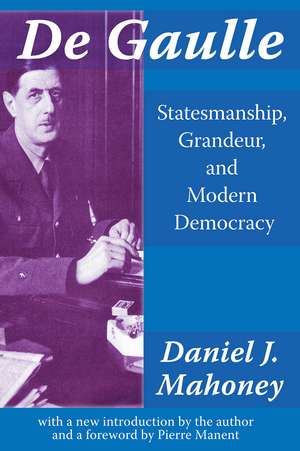De Gaulle: Statesmanship, Grandeur and Modern Democracy
Autor Daniel J Mahoneyen Limba Engleză Paperback – 31 aug 2000
Mahoney shows how de Gaulle repeatedly and explicitly rejected the cult of the Nietzschean superman, the Bonapartist separation of grandeur from moderation, and all temptations of personal and ideological despotism. He explicates de Gaulle's self-understanding as a statesman or "man of character" who comes to the service of a democratic political order in a time of crisis. He articulates de Gaulle's relationship to classical and Christian thought, his place in the French tradition, his profound debts to the Catholic poet-philosopher Charles Peguy, as well as his important affinities with Alexis de Tocqueville on the need to remain faithful to the dual imperatives of democracy and grandeur.
In addition, the book discusses the principal moments of de Gaulle's statecraft from his "appeal" to resistance in June, 1940, and his founding of a new French Republic in 1958, to his articulation of a "Europe of Nations" in the 1960's. In doing so, Mahoney thoughtfully clarifies the Gaullist understanding of the "problem" of democracy: The democratic statesman must correct the corrosive acids of modern individualism, while accepting that democratic individualism sets the inescapable contours of political action in our time.
Written in clear and non-technical l
| Toate formatele și edițiile | Preț | Express |
|---|---|---|
| Paperback (1) | 427.50 lei 6-8 săpt. | |
| Taylor & Francis – 31 aug 2000 | 427.50 lei 6-8 săpt. | |
| Hardback (1) | 1000.27 lei 6-8 săpt. | |
| Taylor & Francis – 2 aug 2017 | 1000.27 lei 6-8 săpt. |
Preț: 427.50 lei
Nou
Puncte Express: 641
Preț estimativ în valută:
81.80€ • 85.41$ • 67.55£
81.80€ • 85.41$ • 67.55£
Carte tipărită la comandă
Livrare economică 15-29 aprilie
Preluare comenzi: 021 569.72.76
Specificații
ISBN-13: 9780765806895
ISBN-10: 0765806894
Pagini: 210
Dimensiuni: 152 x 229 x 17 mm
Greutate: 0.25 kg
Ediția:1
Editura: Taylor & Francis
Colecția Routledge
Locul publicării:Oxford, United Kingdom
ISBN-10: 0765806894
Pagini: 210
Dimensiuni: 152 x 229 x 17 mm
Greutate: 0.25 kg
Ediția:1
Editura: Taylor & Francis
Colecția Routledge
Locul publicării:Oxford, United Kingdom
Cuprins
Foreword by Pierre Manent Introduction: The Thought and Action of Charles de Gaulle De Gaulle's Idea of France The Man of Character as Born Protector: Magnanimity, Justice, and Moderation in de Gaulle's The Edge of the Sword De Gaulle's Mission and the Legitimacy of Free France Democracy, Greatness, and Civilization: De Gaulle and a Certain Conception of Man De Gaulle's Constitutional Correction: Executive Power and the Theory and Practice of Modern Republicanism The Unity of Europe and the Greatness of France: De Gaulle's Vision of a Europe of Nations Notes Selected Bibliography Index
Notă biografică
DANIEL J. MAHONEY teaches political science at Assumption College, Worcester, MA./ee is the author of The Liberal Political Science of Raymond Aron (1992), and the editor of In Defense of Political Reason (1994).
Descriere
This analysis of the thought and action of Charles de Gaulle explores the intellectual foundations of Gaullist statecraft. Mahoney's careful exegesis of de Gaulle's major writings and speeches, reveals a penetrating political thinker as well as a major political actor. He explains de Gaulle to an American public that too often sees him as a posturing figure suffering from an exaggerated and misplaced sense of personal and national grandeur. Mahoney shows that de Gaulle's defense of the "grandeur" of France is tied to a fundamentally classical view of human nature and politics. In elucidating de Gaulle's political self-understanding, Mahoney highlights the foundation of his noble but elusive moderation.
Mahoney shows how de Gaulle repeatedly and explicitly rejected the cult of the Nietzschean superman, the Bonapartist separation of grandeur from moderation, and all temptations of personal and ideological despotism. He explicates de Gaulle's self-understanding as a statesman or "man of character" who comes to the service of a democratic political order in a time of crisis. He articulates de Gaulle's relationship to classical and Christian thought, his place in the French tradition, his profound debts to the Catholic poet-philosopher Charles Peguy, as well as his important affinities with Alexis de Tocqueville on the need to remain faithful to the dual imperatives of democracy and grandeur.
In addition, the book discusses the principal moments of de Gaulle's statecraft from his "appeal" to resistance in June, 1940, and his founding of a new French Republic in 1958, to his articulation of a "Europe of Nations" in the 1960's. In doing so, Mahoney thoughtfully clarifies the Gaullist understanding of the "problem" of democracy: The democratic statesman must correct the corrosive acids of modern individualism, while accepting that democratic individualism sets the inescapable contours of political action in our time.
Written in clear and non-technical l
Mahoney shows how de Gaulle repeatedly and explicitly rejected the cult of the Nietzschean superman, the Bonapartist separation of grandeur from moderation, and all temptations of personal and ideological despotism. He explicates de Gaulle's self-understanding as a statesman or "man of character" who comes to the service of a democratic political order in a time of crisis. He articulates de Gaulle's relationship to classical and Christian thought, his place in the French tradition, his profound debts to the Catholic poet-philosopher Charles Peguy, as well as his important affinities with Alexis de Tocqueville on the need to remain faithful to the dual imperatives of democracy and grandeur.
In addition, the book discusses the principal moments of de Gaulle's statecraft from his "appeal" to resistance in June, 1940, and his founding of a new French Republic in 1958, to his articulation of a "Europe of Nations" in the 1960's. In doing so, Mahoney thoughtfully clarifies the Gaullist understanding of the "problem" of democracy: The democratic statesman must correct the corrosive acids of modern individualism, while accepting that democratic individualism sets the inescapable contours of political action in our time.
Written in clear and non-technical l












